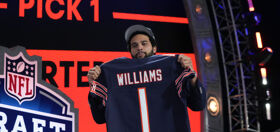
National conversations about book banning have erupted in recent weeks as conservatives around the country rally to challenge titles that they deem “age inappropriate” for schools and libraries.
The practice of censorship has gone on for decades and mostly affects books that deal with topics of race, sexuality, or gender. Recent bans in Texas and other states continue a dangerous trend of linking queerness to vulgarity, and alienating kids from stories that would strengthen their sense of identity.
LGBTQ youth who haven’t yet formed support systems rely on the internet and libraries to gain insight into who they are and who they are becoming. In a time where the number of challenged books is unprecedented, we must rally to support both authors and readers, and keep these books on shelves.
Here are ten of the most crucial banned titles, ranging from picture books to YA novels to adult nonfiction…
How about we take this to the next level?
Our newsletter is like a refreshing cocktail (or mocktail) of LGBTQ+ entertainment and pop culture, served up with a side of eye-candy.
“And Tango Makes Three” by Justin Richardson

The book tells the true story of two male penguins who raised a chick together at the Central Park Zoo. It has appeared eight times on ALA’s annual list of most banned books for depicting a same-sex relationship between penguins, but is a beautifully illustrated and touching way to introduce children to non-heterosexual family dynamics.
“Daddy’s Roommate” by Michael Willholte

The second most banned picture book from 1990 to 2000 tells the story of a little boy whose father has moved in with another man following a divorce. It portrays the family doing chores, facing arguments, and showing affection, as all families do. The book initially faced objections at Hays Public Library in Kansas for “normalizing” a homosexual lifestyle, but formed one of the first mirrors ever for kids growing up with gay parents.
“Melissa” by Alex Gino

Alex Gino’s “Melissa”, published under the title “George” until 2022, has earned the title of the most banned book in history for featuring a story about a transgender fourth grader who grapples with the world seeing her as someone she is not. Allegedly the bans surround the theme of hormone therapy, which some schools claim is not a conversation to be had with elementary schools. It is a poignant novel that shows trans children it’s OK to be who they are.
“I Am Jazz” by Jazz Jennings

Featuring the real life experiences of TV personality and LGBTQ activist Jazz Jennings, this book has been challenged every year since 2016, when a Florida-based Library Counsel group threatened to sue over its presence in libraries. It is challenged for featuring a trans character and topics that are said to be politically charged. Jennings, now 21, is one of the youngest publicly documented people to be identified as transgender and to share her story confidently with the world.
“Rainbow Boys” by Alex Sanchez

This first book in a trilogy features conversations on the issues that three gay and questioning teens face as they navigate high school and gain the confidence to come out. The book received complaints for explicit sexual content in Texas, Arkansas, and New York, and was removed from a library in New York. It is a classic YA story that gave voice to a wave of new YA books centering gay teen stories.
“Two Boys Kissing” by David Levithan

“Two Boys Kissing” tells the true story of two teenage boys who participate in a 32 hour kissing marathon in an attempt to break the Guinness World Record for the longest kiss. Narrated by a Greek chorus of gay men who lost their life to AIDS, the book was first challenged at Fauquier High School in Warrenton, Virginia for its cover image. The book explores the contemporary struggles of gay youth as well as historical struggles of the ones we’ve lost.
“Beyond Magenta: Transgender Teens Speak Out” by Susan Kuklin

Author and photographer Susan Kuklin interviewed six transgender and non-binary young adults, who describe their sense of identity before, during, and after transitioning. The book has been challenged under concerns that it is “anti-family”, features sex education, and pro-trans viewpoints thought by challengers to be overtly political. The Stonewall Honor book provides a collection of crucial first-hand accounts into the experiences of the transgender community.
“Lost Prophet: The Life and Times of Bayard Rustin” by John D’Emilio

Rustin has been largely marginalized as a figure in the Civil Rights movement because of his sexuality. This book was met with outcry from an Oklahoma City school board, but is a profound look into a queer hero from the movement who is often lost in history lessons and overlooked.
“The Color Purple” by Alice Walker

A frequent offender on countless banned books lists, “The Color Purple” is often charged for “troubling discussions on race relations”, for featuring homosexuality, and for its “troubling ideas about man’s relationship to God”. The book primarily focuses on the vulnerable relationship between two Black female characters—Celie and Shug—and takes a searing look at sexual violence in the Black community.
“Gender Queer” by Maia Kobabe

This illustrated memoir tells Maia Kobabe’s story from childhood to adult, identifying as non-binary and asexual. First banned by the Fairfax County School Board in Virginia, the book was called inappropriate for featuring LGBTQ characters and discussions of sex. It has since been challenged in six more states. It covers at a myriad of topics with humor and honesty, including “adolescent crushes, coming out, bonding with friends over erotic gay fanfiction, and facing the trauma of pap smears.”
Ryan Douglass is a New York Times bestselling author and freelance writer from Atlanta, Georgia. His work on media representation has appeared in HuffPost, Atlanta Black Star, LGBTQ Nation, and the National Council of Teachers of English. He is the author of The Taking of Jake Livingston and the poetry book Boy in Jeopardy. Find him on Instagram @ryan_souflee.




















SamB
There are only 2 books for adults on this list, what adult wants a book for children their bookshelf?
And the most banned book in history is definitely not “Melissa”… more arguably it would be “The Catcher in the Rye”
Bosch
You were all up in arms about censorship and cancel culture when the subject was medical misinformation, but here your biggest complaint is that adults don’t want children’s books? Hmmmm…
SamB
Bosch: These books aren’t “banned” in the old sense of the term. You can buy them if you want them.
Bosch
Sam: removing an episode of a podcast from spotify also isn’t “banning” in the old sense of the term.
SamB
Bosch: C’mon. You wanna go down this rabbit hole? The books on this list were removed from schools, whether or not you think they’re appropriate for the kids or not. Ultimately it’s a “who cares” because parents can buy the books for the kids if they really want to. There is a big difference between feeling your kids isn’t ready to talk about what trans is to an adult going out and buying anything they want, or listen to whatever they want. A child’s brain is not developed… hopefully most adult brains are, but I guess not always.
Bosch
Sam: I’m not here to argue about what is and isn’t appropriate for kids, I’m just pointing out that your position on removing medical misinformation from a commercial platform is hypocritical. It wasn’t about “freedom of speech” for you, it was about disagreeing with the “left*.
Bosch
And before you throw out another “it’s different”, no one is stopping Rogan from releasing unpublished episodes via his own media channels.
SamB
Bosch: No that’s not true, regarding my problem with the Joe Rogan thing. I think as an adult, listening to a podcast made for adults, should be allowed. I don’t need editing because I’m an ADULT and can form my own opinions. Have you ever seen a kid at a restaurant? I’d go with my brother and wife and his two young boys (at the time) and they’d get loud and argumentative because they wanted a dinner that my brother knew they didn’t like because they tried it before. I even asked him “why not just teach them a lesson and order it” and he said “I’ve done that before and they don’t eat it and get all fidgety cause they’re hungry.” Kids need leadership…. I understand and know what I want. If I make a mistake it’s on me.
barryaksarben
Of course a cowardly little straight white boy would of all books mention the most overrated pos next to anything by Ayn Rand. Catcher in the rye has the searing honesty to talk about a white boy jackin off. WOW! something white guys can get up in arms about. Good thing Salinger didnt write another book as it would have shown him for the sexist pig he was. Ask any of the very young girls he groomed. they were JUST of age when he was in his 40s 50s and 60s but with trump we see they like rapists and pedophiles. Im sure it is your favorite book if it isnt “Atlas shrugged” Isnt it? Hey coward why are still pretending ot be straight and NOT a far right wingnut? How many screen names do you use and do you beat off while on this gay site night in and night out thinking about all those gay men you think you are controlling. Lots of internalized homophobia for a straight guy
SamB
Barry: I said I think it’s probably one of the most banned books in the world, I didn’t say I liked it. No one reads “Atlas Shrugged” they just pretend they did. I am not straight, i am openly gay and with a partner. I use only this screen name. Does it surprise you that a gay man doesn’t have 100% the same opinions as you? Should we all be a monolith with no original thought?
Bosch
SM: you, just like me, believe that access to things should be limited if they are considered harmful. You clearly think it’s harmful for children to learn about tolerance and acceptance, while I think it’s harmful to spread medical disinformation during a global pandemic.
You are so wrapped up in the whole left-right paradigm that you’re not even aware of your own opinions. You are not against censorship, you’re just against agreeing with the “woke”.
Bosch
Sam: bitching about the LGBT community every chance you get isn’t just having a “different opinion”. You’re intentionally antagonistic. Own it.
SamB
Bosch: We are not the same. I believe ADULTS should be given all the information that is out there. Every adult can make up their own mind, even if it doesn’t follow your thinking. I think children can learn bout tolerance the same way you and I did as kids… in an age appropriate manner.
Do you think a child’s thinking is the same as an adults?
The “woke” are against differing opinions, I’m not.
Bosch
Sam: I’m sure you remember what I do for a living, so you don’t need to tell me about childrens’ cognitive abilities.
So explain to me the circumstances under which it is damaging to let a child learn that some people are straight and some people are gay, and that neither is better than the other?
Bosch
” I think children can learn bout tolerance the same way you and I did as kids…”
I think maybe you are unaware of what American conservatives teach their children about gay people.
SamB
Bosch: Ok. At what age does a child understand what gay and straight is? And what trans is?
Bosch
A child understand what straight is as soon as they see two straight people in love. A child understands what gay is as soon as they see two gay people in love. What they don’t understand are the social and political subtext, nor the complexity of personality disorders that drive homophobia on an individual, social, or institutional level.
So it is important to teach them to treat people with dignity BEFORE they come in contact with discrimination.
Bosch
And if you need a more specific number, I knew I was gay when I was 5. And I’m guessing the more observant people knew you were gay when you were little too.
SamB
Bosch: Yes I want specifics. The age you understood it is 5. Does that mean every kid understand it at the age of 5?
Bosch
There are people on their 40s who don’t even understand what gay is.
So wouldn’t it be helpful if there were some age-appropriate books that could help children learn on time?
You do realise that for many of these books, the target audience is gay and lesbian children, not straight ones?
And yes, every kid can understand at 5 years old that some princes marry princesses, and some princes marry princes, and that there’s nothing wrong with either.
I take it from your questions that you didn’t understand your romantic orientation until later?
SamB
Bosch: People in their 40’s know what gay is. If they don’t want to identify that’s their problem.
And “target audience” is nothing. Is a teacher going to say “Here Sabastian read this gay book. Mike, you read this straight book?”
What do you know about “American Conservatism”? I’m not religious and do want that removed from politics but people have a right to teach their kids their belief system.
Bosch
Sam: if every book featuring a gay relationship is a “gay book”, then every book featuring a straight relationship is a “straight book”.
You must understand why the book about gay penguins should be required reading for all kids.
And when I was a kid there were no “gay books”. But there were stories on the news about how being gay led directly to AIDS.
I’m having trouble believing that your a gay man, and yet you think it’s somehow harmful for children to know of your existence. It’s almost as if you’ve internalised some bad opinions about being gay.
SamB
Bosch: I don’t know why it’s so shocking to you that a gay man thinks differently than you do. Are we all supposed to think the same? I knew when i was 7. My partner not until he was in his late 20’s. He’s a bit more liberal that I am would agree with you about the books, but my issues isn’t with the books themselves, it’s with if they’re going to be taught in school. These books are available to anyone if the parents want to buy them.
Bosch
I’m not shocked by people who think differently, I’m shocked by gay men who do not want to make life less difficult for all the little gays and lesbians on the planet.
Bosch
Explain why it’s ok to teach children about straight relationships in school, but not gay relationships. Why shouldn’t gay relationships be normal?
Bosch
“These books are available to anyone if the parents want to buy them.”
Little gay Tommy with homophobic parents needs to know that there is a place for him in the world, needs to see himself reflected back at him in society, needs to see his own feelings represented in a just and neutral manner. But his school library banned all gay books and his homophobic parents won’t buy it for him.
So where does he go looking?
The internet.
I’m sure you’re smart enough to know what he’ll encounter.
SamB
Bosch: No one “teaches” kids about straight relationships. If they have a mom and a dad than that is a mom and a dad. and that is 90% of society. If, by chance, there is a dad and dad then that could be addressed. Can you imagine trying to get a bunch of kids to understand what it means to be straight? gay? trans? non binary. and non-binary isn’t even a real thing!
Bosch
“Bosch: No one “teaches” kids about straight relationships. ”
Are you not aware that almost every fairy tale and every Disney movie ends with a straight couple living happily ever after?
I’m only discussing orientation with you, gender ide tity is a different subject.
It is EASY for kids to understand straight and gay. The kids who struggle with it are the kids who are not exposed to it. What’s so hard to understand about “some boy fall in love with girls and some boys fall in love with boys”? What about that is so complex that you think it confuses or harms a child?
SamB
Bosch: the problem is that you can’t save every kid from homophobic parents.
Bosch
“Bosch: the problem is that you can’t save every kid from homophobic parents.”
So let’s make sure we help none of them?
Bosch
You would rather save homophobic parents from having healthy, well-adjusted kids.
SamB
Bosch: Be realistic. Some kids will thrive. Some won’t. and that’s just kids. not separating them into gay/straight. You do realize that 90% of the world is straight right?
Bosch
Sam: yes, 10% of the world identifies as gay. But you want to shield children from knowing about that 10%, with no ratioal explanation as to why.
Tell me you have internalised homophobia while denying that you have internalised homophobia.
Bosch
“not separating them into gay/straigh”
Don’t you understand? If a child learns that people can be gay when they are young, that doesn’t make them gay. That doesn’t make them confused. It makes them resistent to being indoctrinated with homophobia. It makes them resistent to separating people into gay/straight.
Something which clearly could have helped you.
Bosch
Ok now I know you’re lying. “90% of the world is straight”.
90% of the world IDENTIFIES as straight, but every gay and bisexual person has witnessed first-hand that the actual percentage of heterosexuals is much lower.
I don’t trust you one bit.
SamB
Bosch: You are hilarious. Yes 90% of the world is straight. You do not believe a person when they say they “identify” as straight… yet you absolutely believe a person who says they have no sex (non-binary). You’re just choosing to believe what you want, what fits into what you’ve read in school and been indoctrinated into.
Fname Optional Lname
Saying that banning certain books from school libraries is no big deal because parents are still able to purchase the books absolutely ensures many LGBTQ children will never be exposed to these books and the knowledge that who they are is perfectly normal.
Do we really need to spotlight the daily struggles LGBTQ children face because they do not have adult support in their lives? Bigoted parents are not going to run to Barnes and Noble to buy a book about gay penguins so little Johnny will continue to receive the messages that he is odd and a sinner.
SamB
Fname: What do you think a bigoted parent is going to do when little Johnny comes home and says “We learned all about being gay and trans”? The parents are going to double down and forbid this kid from learning any more about it. Or do you think hearing it from a child will melt their hearts and they will become inviting of all gays?
Unfortunately you have to let parents raise their kids as they see fit, and once they are old enough, the kid can start figuring it out for themselves. There are plenty or resources (public libraries??) where kids can learn all about being gay. You can’t tell a person they can’t raise their kid as they see fit, just because it isn’t the way you would raise a kid.
Bosch
” yet you absolutely believe a person who says they have no sex ”
I said this when? You’re good at making things up, aren’t you?
SamB
Bosch: You believe someone can be non-binary?
Bosch
Sam: you can’t be real. You claim to be gay, yet you have alm the opinions of a straight homophobe who hasn’t had a lick od sexual education. You say the most apathetic, heartless things, and then you cry when someone says you have no empathy.
Your approach to this subject is devoid of empathy. Your approach to Whitney Houston’s death is devoid of empathy. Your approach to medical misinformation which kills people is devoid of empathy. Your approach to the “don’t say gay” bill is devoid of empathy. Your approach to people showing their support for Ukraine is devoid of empathy. Your approach to people’s identities is devoid of empathy.
Your boyfriend is made up, isn’t he?
Bosch
“you believe someone can be non-binaary?”
Ok dumbass. I have you historical proof of the definition of gender, and yet you think non-binary means “having no sex”?
You’re either a huge liar, or really, really, REALLY dumb.
Bosch
“what fits into what you’ve read in school”
Yeah ok Sam. Schools are evil. I must be wrong about developmental psychology, despite my relevant master’s. Chasten Buttigieg must be wrong about education, despite his master’s.
But you, with your apathy and opinions, you know better than all of us.
More worried about protecting homophobic parents than protecting their gay children. You’re a fraud.
SamB
Bosch: Trust me, I’m not crying when someone said I had no empathy, I just pointed out to him where my empathy lay.
And there you go, you just admitted someone can have no sex. Whether you call it “gender” or not, it is what it is. There is something called Biology and if we do a DNA analysis on one of them they’ll come out either MALE or FEMALE. I couldn’t care less what they feel inside. I do have empathy for truly trans people with gender dysphoria, but not for some millennial who smugly wants to be a man one day, a woman the next, and everything or nothing whenever they feel like it. That is a FEELING. I FEEL 33 years old. I am most definitely NOT. Can I change my age?
I don’t know why you find it so difficult to believe I’m a gay man, we all don’t think like a giant collective. And like I asked the other guy, what do you think a bigoted parent would do if their 6 year old kid who comes home saying “I just learned what gay and trans is” What do you think that parent will do?
Bosch
Sam, “non-binary” isn’t a biological configuration. It’s a gender identity.
So we solved the mystery, you’re just really, really dumb. And probably a narcissist.
Bosch
“I don’t know why you find it so difficult to believe I’m a gay man, we all don’t think like a giant collective. ”
Simple. Because you demonstrate zero understanding of what it is to exist as a gay man in a heteronormarive world.
SamB
Bosch: Your use of “Gender” is just a psychological trope. People are men or women. If someone has gender dysmorphia that means they believe they are in the wrong body and that is a real thing. If someone believes they are whatever they want to be at any given time they are not playing in reality.
My partner is sitting on the other couch across from me right now, so I’m pretty sure I’m gay and I’m pretty sure I’ve been living in a “heteronormative” world since birth and I have not been scarred by evil straight people wanting to keep me down. You seem to assume everyone under a certain label must all think alike. All gay men feel traumatized. All gay men hate straight people. As a psychologist you should KNOW everyone is different, right? Why you trying to put me in a box? I just look at things with logic, rather than feelings.
Bosch
“Your use of “Gender” is just a psychological trope. People are men or women. If someone has gender dysmorphia that means they believe they are in the wrong body and that is a real thing. ”
Gender DYSPHORIA means someone is dissatisfied with their gender expectations. It is only marginally related to the concept of gender.
Gender is not a psychology “trope”, Sam, it’s a description of very real behavioural and psychological categories.
And since you seen to like bringing up trans people all the time, I’m pretty sure I told you before that neuroscientific research has shown that trans individuals have a biological mismatch between the sex if their central nervous system and the sex if their reproductive organs. And since the reproductive organs control sex-specific hormone production, they also control secondary sex characteristics.
But if you think that a person’s genitals are more important than a person’s central nervous system, then that explains why you’re always such a dick.
If you looked at things with logic, then this knowledge would change how you talk about trans people. If you looked at things with logic, you would understand that the concept of gender exists whether or not we give it a name. If you looked at things with logic, you would base your opinions on child development on decades of targeted research, instead of your “feelings” about whether uneducated 16 year old drunk idiot Floridian parents, who aren’t even old enough to understand themselves, should be in control of the state’s educational programs.
Bosch
“My partner is sitting on the other couch across from me right now, so I’m pretty sure I’m gay ”
Does your partner read the comments you leave on Queerty?
Bosch
“As a psychologist you should KNOW everyone is different, right? ”
Trust me Sam, I know not every gay man is an apathetic narcissist who gets his kicks out of trolling other gay people.
SamB
Bosch: You’re right, it is gender dysphoria. And FYI: “Gender is not a psychology “trope”” Should be “Gender is not a psychological trope”
Your quote: Gender DYSPHORIA means someone is dissatisfied with their gender expectations.
My reply: I notice the very specific words you use. WTF is “gender expectations”? I know what you mean, but it’s another nonsense phrase. A trans person’s brain is telling them they are the opposite sex. It’s a medical condition and I have not slammed trans people. I believe an adult trans person should do what makes them happy. I have a problem with “non-binary”. A trans person is not “non-binary” “Non-binary” people do not exist in real life. Trans people DO exist. There is a difference I’m not sure why you, a trained psychologist, can’t understand the difference.
No I hide my secret life from my partner, it’s my deep dark secret.
Bosch
“There is a difference I’m not sure why you, a trained psychologist, can’t understand the difference.”
I’m sorry, when did I say there was no difference between trans people and non-binary people? Making stuff up again?
“Non-binary” people do not exist in real life. ” again, Sam, non-binary is not a biological configuration, it is an identification. An identification exists as soon as a person identifies with it. All identities are equally real and equally unreal, including yours. Saying they don’t exist is like saying cowboys don’t exist.
” I know what you mean, but it’s another nonsense phrase.”
Are you implying that you have no gender expectations? Your aversion to non-binary identification IS a gender expectation. You don’t even think about your opinions, you’re just focused on disagreeing.
Bosch
You’re not even lying about these queerty comments being a secret, are you? I’m guessing if your very real boyfriend saw the things you write, it would change his opinion of you.
Sounds like a healthy relationship.
SamB
Bosch: You keep saying I hate trans people, and I don’t and that’s been pretty clear. If all “identities are real” then why aren’t I 33? Why can’t I go to the DMV and force them to change my age? What about people who are now popping up saying “I identify as a cat?” I’ve seen the clips the people are obviously insane but you will believe them. Will we now have to have giant litter boxes at work and restaurants?
No. There is literally no such thing as non-binary. You were taught incorrect information and you didn’t question it and now you’re stuck believing this bullsh*t. I feel bad for you.
I don’t hide things from my partner, he knows what my opinions are. Again how, as a trained psychologist, can you believe people can’t have differing opinions? That I truly find shocking because that means any clients you have you’re going to push them down a path YOU think they should be on and not the path they should be on.
Bosch
“That I truly find shocking because that means any clients you have you’re going to push them down a path YOU think they should be on and not the path they should be on.”
Hmmm, kinda like how you want schools to push little gay children down a straight path?
But for the record, I’m a psychologist, not a psychiatrist.
Bosch
“If all “identities are real” then why aren’t I 33? Why can’t I go to the DMV and force them to change my age? ”
Because age isn’t an identity, it’s a measurement. Maturity is an identity. Like how sex is a measurement, and gender is an identity.
Bosch
Here I’ll do the next bit for you.
“But then how come I can go to the DMV and ask them to change my gender”?
Because your driver’s license is used to identify your face, not your genitals.
SamB
Bosch: You need to get your thoughts collected into one posting. I know you’re not a psychiatrist or you’d probably not be spewing this stuff. Psychologists have patients, you don’t? Do you just spend your time theorizing? If the driver’s license is there to identify only the face then why do they include “sex”?
My maturity level is also at 33, so according to your rules I should be able to change my age. I can’t change my age because it exists. My sex exists as well. How I feel is irrelevant to anyone other than me, and maybe my partner depending on what it is.
Bosch
Oh please. Are you gonna act like you’ve had to show your driver’s license and your dick to an officer? You seriously don’t understand why your gender can go on your license?
You think psychology is just a bunch of stuffy old men “theorizing”? No, I’m a neuroscientific researcher. I don’t fix people, I just study their brains.
How come you have such an anti-intellectualist attitude? You claim to operate on “logic” instead of “feelings”, yet you value opinion far more than you value knowledge.
Bosch
Doesn’t your very real boyfriend feel a bit ignored, with you spending all day arguing with strange men on the internet?
SamB
Bosch: “Gender” doesn’t appear on your drivers license. “Sex” does.
If you’re a neuroscientific researcher then you should have a science background? A neuroscientist needs scientific/biological knowledge of the brain and nervous system… spinal chord. Did you just lie or stretch the truth. A psychologist can only theorize, because you can’t prove anything you say.
My very real partner (we’re too old to be boyfriends), and I are currently watching Murder on the Orient Express. I’ve been telling him details of our conversation and he told me to “give it up, he’s just arguing with your for the sake of it”
Yooper
Guys, just get a room already..
Eternal.Cowboy
This was the telling quote from SamB
“ I think children can learn bout tolerance the same way you and I did as kids… in an age appropriate manner.”
He thinks being gay is something to be “tolerated”.
You really have to feel sad for someone that sees their existence as something that society at large should tolerate the existence of.
Bosch
Hahahaha oh Sam… Neurology is a field of psychology. And psychology is a science. Did you finish high school?
SamB
Bosch: You said you were doing neuroscientific research. That is very different than neuropsychology.
And psychology is a social science, not the same.
SELA Rising
SamB
Bosch: Trust me, I’m not crying when someone said I had no empathy, I just pointed out to him where my empathy lay.
And there you go, you just admitted someone can have no sex. Whether you call it “gender” or not, it is what it is. There is something called Biology and if we do a DNA analysis on one of them they’ll come out either MALE or FEMALE.
LOL doing DNA analysis… You would need to do a chromosomal analysis, and you would find that there are more than 40 variations that give us the beauty of intersexxed individuals and biologically non binary individuals.
This is science. Not everyone is XX or XY, male or female, and we have known that since time immemorial. Hermes and Aphrodite had a non binary child. ( i reference this myth to show how long we’ve been looking for answers to these questions on gender and sex)
You really don’t know what you are talking about when it comes to sex or gender, and you show your ignorance often.
Bosch
Sam: are you seriously trying to explain to me what I do for a living? Explain to me how to become a neuroscientist without first studying psychology. That’s like becoming an aircraft engineer without studying aerodynamics.
“It’s a social science, that’s different” <- this tells me, and everyone who reads your messages, that you know nothing about psychology OR science.
PerryBrass
I can’t believe you don’t have HEATHER HAS TWO MOMMIES by Leslea Newman at the top of this list. It was the most banned book in the US for about a decade. It was included in the Senate Record when Jesse Helms went on a long rant against it. on the Senate floor. It was one of the first openly lesbian books for kids ever published in rthe US. As a writer and friend of the author’s, I can tell you it was pretty lascerating to have your, or her, book talked about that way publicly. For writers, having your books banned is never good: it does hurt you. Even the very fleeting publicity is bad: you want your books to be known for the enjoyment people get out of them, not for the fact that some asshole like Helms thinks they should be removed from circulation.
Terrycloth
Kids see two of the same gender holding hands or maybe kissing , they see love , when they see a person of color they don’t see the color they see the.person..hate is learned from parents ( not always) or from others..sit on a bench and just watch kids play ..there’s kindness and boys play with girls and boys..everything is only made a big deal if you are it one..a book of 2 boy penguins, seriously .I bet if it was read aloud in a class full of kids they would think it’s a awesome sweet story..nothing more.
Yooper
These books aren’t banned, though taken out of some, not all, school Libraries. Pretty shi**ty, indeed, but they re still available and if kids today are anything like they have always been they’ll find a way to obtain and read.